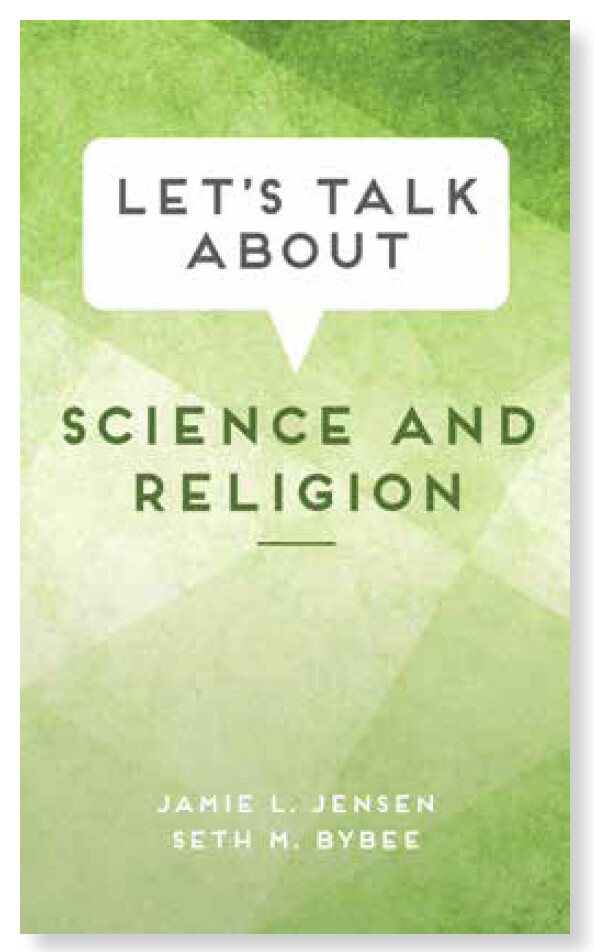In a BYU devotional address given in November 2020, professor Jamie Jensen, author of the new book, Let’s Talk about Science and Religion, opened by discussing the difference between three words: Atheism, Theism, and Agnosticism.
“Atheism: the belief that there is no God.
Theism: the belief that there is a God.
Agnosticism: the absence of belief.”
Jensen recalled an experience with a professor who claimed that scientific evidence proves there is no God, something Jensen calls a “misconception [that has] driven many people away from God in their pursuit of science.” Jensen goes on to say, “Science is no more atheistic than it is theistic. There is no scientific evidence for or against the existence of God.”
For Latter-day Saints, this statement made at BYU devotional can be startling or surprising because it calls to mind a scripture from the Book of Mormon which says “All things denote there is a God; yea, even the earth, and all things that are upon the face of it, yea, and its motion, yea, and also all the planets which move in their regular form do witness that there is a Supreme Creator.” (Alma 30:44) Is what Jensen is saying in contradiction the words of Alma? On this week’s All In podcast, host Morgan Jones Pearson asked Jensen for clarification.
The following excerpt has been edited for clarity.
Morgan Jones Pearson: You have a whole chapter in this book called “Science is Agnostic.” And you write this "When we say that science is agnostic, we mean that science cannot prove there is a God any more than it can prove that there is not." And you also Jamie gave a BYU devotional which I watched in preparation for this that I really enjoyed, where you said, "There is no scientific evidence for or against the existence of God." I think there may be some listening who may struggle initially or bristle at that, because of the scripture in Alma that says all things denote there is a God, can you explain why you say science is agnostic? And how that can be true while all things can still denote that there is a God?
Jamie Jensen: I love this question. And we've gotten it quite a few times since there's so much in this question. So first, when I say that science is agnostic, agnostic means without belief, right? And so science as a process is inherently without belief. We don't say we believe in gravity, we don't say we believe in evolution, we just look at the data, interpret and say the data seems to show, this is the best explanation. So we say that the evidence supports evolution, or the evidence supports the fact that gravity exists. Every time I drop something, it falls. But there isn't any belief involved.
So, from that perspective, when we're talking about God, there's no way for me to scientifically prove that there is a God, just as there is no way for me to scientifically disprove that there is a God and I love this thing. I don't even know who said it. I use it all the time. But "the absence of evidence is not evidence of absence." Right? So just because there isn't evidence for a God, scientific evidence, tangible, measurable, shareable, transferable evidence that there is a God, that doesn't mean He doesn't exist. So that's one thing to keep in mind. But the other issue with that scripture, and Alma 31 if you're not familiar with that story, if people are listening, Alma is talking to Korihor, he's an antichrist, he's saying, there's no evidence of God. There's no way you can show me that there is a God. And Alma says that famous scripture that that all things denote, there is a God and I firmly believe that. All things denote that there is God. However, that's not how you gain a testimony. So, I couldn't go to my colleagues who grew up without belief and say, See this tree over here and how amazing photosynthesis is. Surely that is evidence of a god. That doesn't work for someone who hasn't gained that testimony through spiritual evidence. And I was actually reading President Kimball's second century address for BYU. And he made the point that we as BYU professors need to be bilingual. And what he was meaning is that we need to be totally fluent in the language of science and be able to speak to our science colleagues, and we need to be totally fluent in the language of the Spirit and be able to speak to our religious colleagues and to the students. And for me, this scripture came to mind in Alma 30, that I have to be able to explain science without invoking God as an explanation. I have to be able to say ‘This is how this could have occurred. This is what the evidence shows, this is what we believe happened.’ And then once you've gained a testimony through spiritual evidence, so that's what has to come first. You have to have a testimony using spiritual evidence only that God really is real. And then when you turn around with those new eyes, and you look at the world, everything does denote there's a God and then it's easy for me to see that. All of life and all of the complexities of the cell and the body and all of that, they do bear testimony that God is very real. But I can't use that as my testimony because that's not something that we can actually use scientific, physical, tangible evidence, and you have to think in your mind, is this something that someone who doesn't believe in God would accept as evidence that there is a God and it brings up, when we try to do that, it's a common mistake that people make called the God of the gaps, which I've got a whole chapter in there on that as well. So when you're trying to use physical scientific evidence, to prove that there is a God, you're falling into the trap of a God of the gaps, right? You're saying, ‘Well, since science can't explain this, isn't it so amazing, therefore, it must be God.’ And then when science does explain it, all of a sudden, where did your God go? And that's why I like to emphasize that you need to build your testimony on spiritual evidence, which is just as real and the process is just as real. But it's different. You build your testimony. And then once you've done that, then yeah, you look around and everything denotes there is a God, but everything denotes there is a God to believers. To unbelievers, it doesn't work that way.
Morgan Jones Pearson: Fascinating. And you also point out that viewing science as agnostic, keeps us from viewing it as a threat to our faith. Can you explain why that is?
Jamie Jensen: Yeah, so as soon as you start to put God in for explanations, for example, of what science can't explain, then you've got this dichotomy that if science can explain it, then God's not real, you know, or if science can't explain it, then God's real and that shouldn't be but then also, a lot of people that I've spoken to, in my line of work that are non-religious scientists have a mistaken impression that science is atheistic. So they're almost using a reverse of the God of the gaps because they're in that same dichotomy, right? Because science can explain it, therefore, there's no need for God. And so if you're trying to use science to prove there is a God, you're falling into the same pitfall that the atheists are trying to use science to prove that there's not. And so you've got to step back from that and say, the evidence of God is non-tangible. It's not scientific, it's above nature. It's not natural evidence. It's above nature. And it's not something science even touches. Science doesn't have any kind of belief system. And so that viewing science is agnostic is protective. It's not pitting them against each other.


